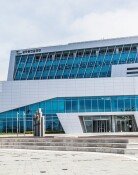Korean firms falter amid rising counterparts of China, Japan
Korean firms falter amid rising counterparts of China, Japan
Posted July. 22, 2014 07:35,
Companies in Korea, China and Japan are showing different fates. Chinese companies have grown rapidly in high-tech industries, in addition to their comparative advantage in labor-intensive industries. Japanese companies, which suffered the "lost two decades" in the aftermath of the collapse of bubble economy in the early 1990s, are making a comeback thanks to Prime Minister Shinzo Abe`s economic stimulus and corporate support measures. Chinese electronics companies, including Lenovo, Huawei and Xiaomi, saw their world smartphone market share rise to 20 percent in the first quarter of this year, up from 6.1 percent in 2001. U.S. market share by Toyota, Honda and Nissan, the big three Japanese automakers, has turned upwards.
Contrary to Chinese companies` spurt and Japanese companies` revival, Korea`s global companies, such as Samsung Electronics, Hyundai Motor and LG Chemicals, have seen their operating profit falter sharply, following good performance even amid global economic crisis. Second quarter operating profit at Samsung Electronics fell by 25 percent year-on-year, and LG Chemicals by 28 percent. Hyundai Motor, Kia Motors and POSCO, who will announce second quarter earnings this week, are also highly likely to see their operating profit decline sharply from the previous year. While corporate investment remains sluggish, investment growth in overseas markets topped that of domestic investment, raising concerns of an industrial hollowing out.
The recent dismal performance of Korean companies and sluggish domestic investment are due to worsening profitability coming from strengthening won, political sector and government`s measures to suppress large companies and stringent labor union activities. Some criticize that companies are holding on to cash reserves, hesitant to increase domestic investment and employment. But if the business environment is friendly, it is a company`s inherent nature to increase investments even at the risk of borrowing money. Fundamental reasons should be pondered upon on why Korean companies are reluctant to invest domestically, in order to come up with measures to revive corporate vitality.
With cloud cast on corporate competitiveness, labor-management disputes have increased sharply. In this year`s first half, the number of labor-management disputes stood at 45 cases and total number of lost working days has reached 103,000, a threefold increase from a year ago. Amid the presence of acute issues, including ordinary wage rise and retirement age extension, hard-line labor unions under the Korean Federation of Labor Unions, are about to launch massive strikes. If the labor sector`s summer strikes expand, companies will suffer production setbacks and face more difficulty.
At a breakfast meeting Monday, Deputy Prime Minister Choi Kyung-hwan and Bank of Korea Governor Lee Ju-yeol shared opinions that the downside risk to the economy has increased, due to sluggish demand among other factors. They promised policy cooperation. It is a welcoming sign that the heads of economic and monetary policies met and decided to collaborate each other rather than being mired in unnecessary conflicts. Visible performance should follow from now on.
The government will release measures to vitalize economy at the second half at its economic policy direction announcement on Wednesday. Choi should come up with effective measures that help companies increase investment without hurdles, considering Korean companies` earnings decline and its side effects. The Bank of Korea had been criticized for having missed the time to cut interest rates, but at the Monetary Policy Committee meeting in next month, it would be desirable to cut its monetary interest rate in order to send a clear message of economic boost to the business community.
Headline News
- N. Korea launches cyberattacks on S. Korea's defense companies
- Major university hospital professors consider a day off each week
- Italy suffers from fiscal deficits from ‘Super Bonus’ scheme
- Inter Milan secures 20th Serie A title, surpassing AC Milan
- Ruling and opposition prioritize spending amid tax revenue shortfalls







